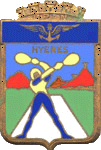
HISTORY
In 1922, the airfield
was rented and the first sheet-made hangar was built. On February
1st 1925, official birth of the military base which was named Centre
d'Aviation Maritime du Palyvestre (Palyvestre Naval Aviation
Center). During the same year, the aviation d'escadre (aviation
group) set up there with its Gourdou-Leseurres and Dewoitine 300s
which was posted to CV Béarn from his commissioning
date in 1927. Landing and wire testings were made at Hyères.
From 1928, seaplane base was created and the 3S1 flight received
CAMS-37s. Between the end of WWI and WWII, NAS Palyvestre accommodated many kinds of aircraft which are now well-known : Morane, Potez, Wibault, Levasseur, Nieuport, Delage, Dewoitine, Chance-Vought, Bloch and even an auto gyro, the Léo C-30 of the 3S2 flight. |
|
|
From November 8th 1942, the base was closed until in early 1945. Seaplane base was destroyed during the Landing of Provence - it was not rebuilt. Instead of, there is an harbor. At this time, the 54.S flight was created, which main mission was landing and catapulting admissions on aircraft-carriers for the French Navy's pilots (Ecole d'Appontage et de Chasse Embarquée). This unit was replaced in 1956 by the 59.S (disbanded in 1997) Ecole d'Aviation Embarquée (Naval Aviation School). The 54.S was first equipped with Seafire Mk IV, SNJ-5 Harvard and SBD-5 Dauntless. From 1950, the air fleet was renewed with F6F-5 Hellcat fighters and SB2C-5 Helldiver bombers. |
|
The USA lent to
France CVL Bois-Belleau and Lafayette which were used
waiting the commissioning in 1960 and 1962 of CV Clemenceau
and Foch. New aircraft,
with a new kind of engine appeared, the era of the jet engine just
begun. |
|
Indeed, the old Corsairs and Avengers were replaced by Aquilons, Fouga CM-175 Zéphyrs, Étendard IVMs, Br.1050 Alizés (turboprop.) and finally Super-Étendards. Those last ones equipped 17.F squadron and 59.S flight based at Hyères. Furthermore, since June 25th 1966, a draft agreement was drawn up between the French Navy and various airline companies such as Air France, Kyrnair and AOM. |
In 1999, up
to 730,000 passengers passed in transit through civil airport,
situated at the south of the airfield. But, the N.A.S. Hyères
is also the military airport of the Mediterranean Zone (Toulon).
The 28.F
squadron (flying on EMB-121
Xingus & Nord-262E
Frégates) based
since March 31st 2000 moved to Nîmes-Garons
on September 1st 2002. Since
the final stopping of air activities from NAS
Saint-Mandrier in october 2003, the three helicopter suqadrons
(31.F, 35.F and 36.F) have moved to Hyères. |
UNITS
Set up on 250 hectares and 8 kilometers of perimeter. The following units are based within N.A.S. Hyères : |
|
Units currently based :
|
Base Aéronavale France : 04-94-12-45-00
![]()
Chemin Palyvestre
83400 HYERES
FRANCE
![]()
Overseas : 00-33-4-94-12-45-00
![]()
sources - acknowledgements :
Bertrand Deleest
Louis Cinca
"Les commandements de l'Aéronautique
Navale" (1912-2000) - Major Norbert Desgouttes ARDHAN 2001
©French Fleet Air
Arm. www.ffaa.net. All rights reserved.









